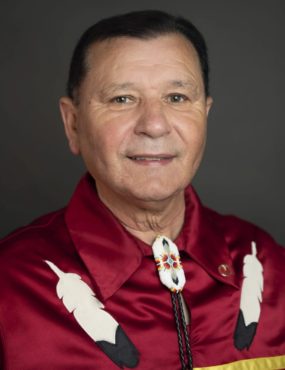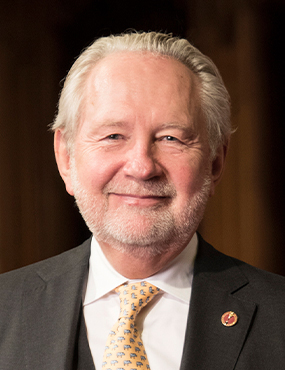Senator Brian Francis was born on September 28, 1957, on Lennox Island First Nation which is located in Malpeque Bay off the northwest coast of Prince Edward Island (also known in Mi’kmaq as Epekwitk). This is where he spent most of his childhood and attended the Lennox Island Indian Day School* from grades one to eight.
At the age of 14, Senator Francis moved away from Lennox Island First Nation to pursue a high school education on the mainland. Despite receiving a substandard education in his early years, he was able to catch up and graduate from high school. Senator Francis went on to complete a four-year apprenticeship in carpentry and became the first Indigenous person on the Island to receive his inter-provincial red seal trade certificate.
While he intended to obtain a Bachelor of Social Work in his mid-30s, Senator Francis joined the labour force three years into the program to support his growing family. He subsequently built a successful 40-year career working in the federal government as well as in First Nations governments. While his journey in public service began with an entry-level position at Veterans Affairs Canada, Senator Francis went on to hold management roles across various departments and agencies. Between 2002 and 2007, he worked with Fisheries and Oceans Canada in Charlottetown where he used his family background and experiences in the fisheries to act as the point of contact for the Mi’kmaq on fisheries-related matters such as the implementation of funding agreements.
In 2007, Senator Francis was encouraged by community members to run for Chief of Abegweit First Nation. He was successful and served as the Chief and Band Administrator from 2007 to 2018. During this time, he worked tirelessly to improve the social, economic and cultural well-being of community members. His contributions included increasing access to educational and employment opportunities as well as building governance and financial management capacity. In addition, Senator Francis led the development of various infrastructure projects including a biodiversity and enhancement hatchery to support conservation and sustainability, a water tower to secure reliable access to safe drinking water, and building and repairing housing units on reserve.
While he was Chief of Abegweit First Nation, Senator Francis was one of the formal signatories to the Canada/Prince Edward Island/Mi’kmaq Partnership Agreement and the Canada/Prince Edward Island/Mi’kmaq Consultation Agreement, which set out a framework for consultation on proposed actions or decisions that could adversely impact asserted or established Aboriginal and treaty rights in the province. He also served on the Executive Board of the Atlantic Policy Congress of First Nations Chiefs Secretariat and the Ulnooweg Development Group Inc.
In 2018, Senator Francis was appointed to the Senate of Canada. He is the first Mi’kmaw/Lnu to represent Epekwitk/Prince Edward Island in this role. He is currently the Chair of the Standing Senate Committee on Indigenous Peoples and a member of the Standing Senate Committee on Internal Economy, Budgets and Administration. He has also been a member of the Standing Senate Committee on Fisheries and Oceans.
In June 2021, Senator Francis sponsored a bill in the Senate that led to the federal establishment of the National Day for Truth and Reconciliation on September 30 of each year. A direct response to Call to Action 80 of the Truth and Reconciliation Commission, the day coincides with Orange Shirt Day and honours the individuals, families and communities impacted by the Indian Residential School System, Indian Day School System and related institutions. Senator Francis subsequently advocated for Prince Edward Island to follow suit. In October 2021, Prince Edward Island became the first province to officially designate September 30 as National Day for Truth and Reconciliation. Other jurisdictions have since followed suit.
Today, Senator Francis remains committed to advancing changes that will positively impact the lives of people in Epekwitk and beyond. He lives near Charlottetown with his wife, Georgina. They are proud parents and grandparents.
*Note: Like Indian Residential Schools, Indian Day Schools were part of a broader process of assimilation and genocide. Approximately 200,000 Indigenous children were forced to attend these institutions from the mid-1800s until 2000. Today, Senator Francis and other Survivors are still responding to and healing from the trauma linked to these state-funded and church-administered institutions, as well as reclaiming and revitalizing the languages, cultures, and practices that were suppressed.





